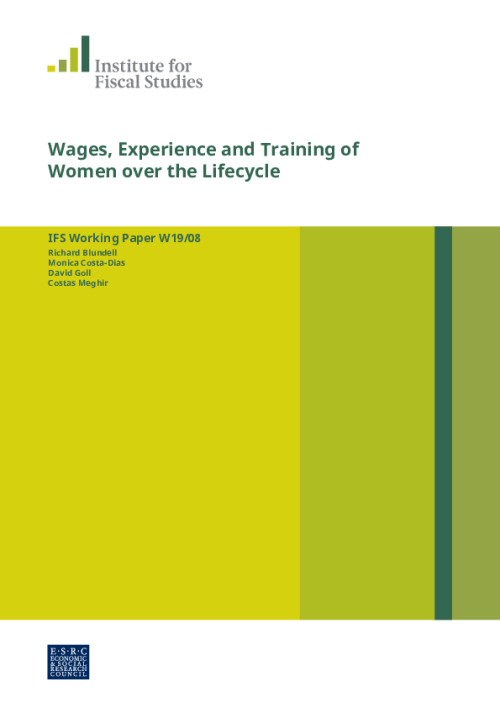Downloads
We investigate the role of training in reducing the gender wage gap using the UK-BHPS which contains detailed records of training. Using policy changes over an 18 year period we identify the impact of training and work experience on wages, earnings and employment. Based on a lifecycle model and using reforms as a source of exogenous variation we evaluate the role of formal training and experience in de ning the evolution of wages and employment careers, conditional on education. Training is potentially important in compensating for the effects of children, especially for women who left education after completing high school.
Authors

CPP Co-Director
Richard is Co-Director of the Centre for the Microeconomic Analysis of Public Policy (CPP) and Senior Research Fellow at IFS.

Research Fellow Yale University
Costas is a Research Fellow of the IFS and a Professor of Economics at Yale University and a Visiting Professor at University College London.

Deputy Research Director
Monica is a Deputy Research Director and Professor of Economics at the University of Bristol, with an interest in Labour, Family and Public Economics.

David Goll
Working Paper details
- DOI
- 10.1920/wp.ifs.2019.0819
- Publisher
- The IFS
Suggested citation
Blundell, R et al. (2019). Wages, Experience and Training of Women over the Lifecycle. London: The IFS. Available at: https://ifs.org.uk/publications/wages-experience-and-training-women-over-lifecycle (accessed: 2 May 2024).
More from IFS
Understand this issue

If you can’t see it, you can’t be it: role models influence female junior doctors’ choice of medical specialty
24 April 2024

Sure Start achieved its aims, then we threw it away
15 April 2024

How important is the Bank of Mum and Dad?
15 December 2023
Policy analysis

Recent trends in public sector pay
26 March 2024

Gap between higher- and lower-paid public sector workers falls by more than a third since 2007 as doctors and experienced teachers have faced unprecedented pay cuts
26 March 2024

Sliding education results and high inequalities should prompt big rethink in Welsh education policy
21 March 2024
Academic research

Labour market inequality and the changing life cycle profile of male and female wages
15 April 2024

Imagine your life at 25: Gender conformity and later-life outcomes
24 April 2024

A senior doctor like me: Gender match and occupational choice
24 April 2024
